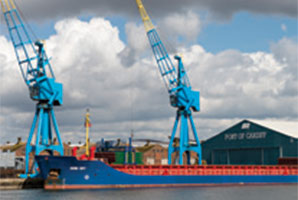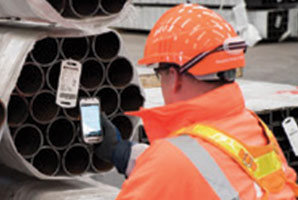“Steel is the big one for us and Tata is a major part of our business – particularly at Port Talbot and Newport and occasionally 26 REPORT – WINTER 2017 27 through Cardiff,” says Matthew. “We are working with Tata on future opportunities and where they can find easier routes into their export markets. We recognise how important Tata is to the Welsh economy, too.
“Tata has been through some difficult times recently but steel prices have recovered and we are pleased to see that their business is improving, with exports obviously benefiting from the exchange rate.”
Through ABP’s facilities at Port Talbot, Tata handles imports of iron ore, coal and specialised bulks for the blast furnace and, while a significant amount of the steel produced goes into domestic use, there are also exports to be handled.
“Tata produces mainly strip coil at various stages of processing, but occasionally is exporting slab as well, depending on demand and rolling capacity,” says Matthew. “This is a globally traded product and a lot of factors can influence it. We have to be really flexible to handle the varying volumes and types.”
ABP South Wales is also critical in supporting the local agricultural industry, handling fertilisers and animal feedstuffs.
This is another area where volumes are growing. ABP responded at Newport by building a new 3,000 sq m shed for AFS; construction of another 7,000 sq m shed is to start soon, and a new automated weighbridge has been installed for slicker transfers from quay to storage to customers.
While steel and agribulks are rooted in tradition, recyclables represent a ‘newer’ growth cargo. These include waste wood and refuse derived fuel (RDF) for power stations in mainland Europe and Scandinavia; glass going to Spain and Portugal for recycling; and scrap, with volumes dependent on the steel sector, going to the Mediterranean, India and China.
Timber, cement and aggregates imports for local construction projects are doing well; fuel, chemicals and other liquid bulks are important particularly in Cardiff; an intermodal terminal at Barry handles raw materials for the Dow Corning facility, with some products distributed out by tanker and some by containers; bitumen comes in through Cardiff for road projects; industrial products dominate the weekly container service linking Cardiff with Ireland; and Swansea’s two drydocks look set for a busy future in ship repair following a major refurbishment and lease agreement with Swansea Drydocks Ltd.
ABP South Wales also has an impressive record in power generation, particularly through a 4.5 MW ground-based solar array at Barry as well as wind turbines and solar panels at Newport and Swansea.
“Altogether we have the capability to generate 11 MW of embedded power across the South Wales ports, which is enough to satisfy the ABP need in the region and significantly reduce our carbon footprint,” says Matthew. “We are also about to start a project in Barry to introduce battery storage technology.



